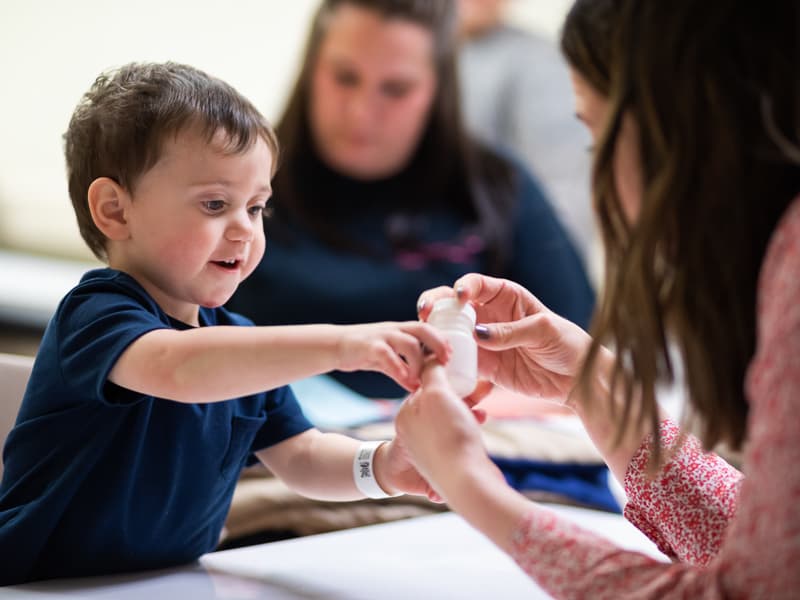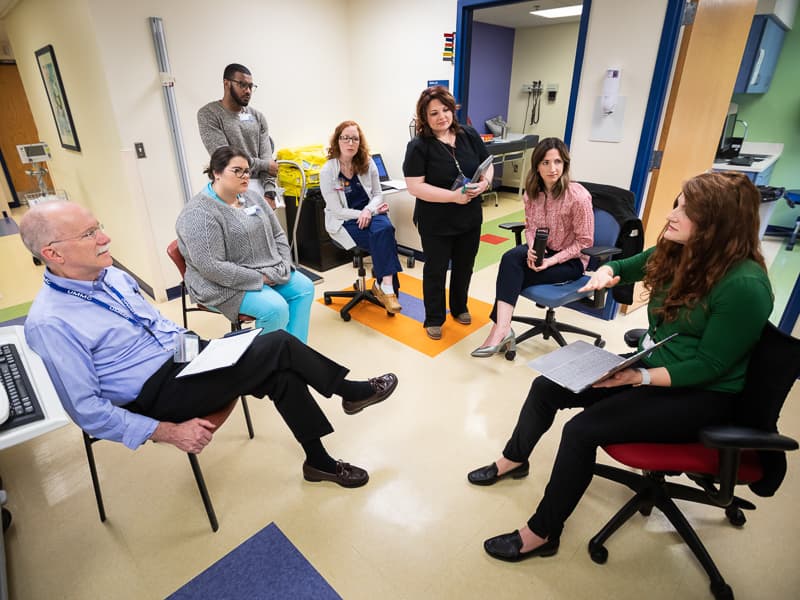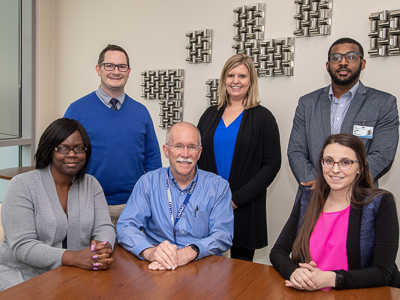Be-HIP focuses on mental health services for high-risk infants, preschoolers
Maysen Everett was happily intent on stacking red blocks, and then, as requested, deconstructing his tower piece by piece.
That was a good sign to Children’s of Mississippi behavioral specialists observing his play time.
Maysen, a 2-year-old from Picayune, is one of many children who started life as a patient in the University of Mississippi Medical Center’s neonatal intensive care unit and are now getting a continuum of care through implementation of a new service grant.

The $2.5 million Substance Abuse and Mental Health Services Administration grant will help UMMC professionals provide mental health screenings and services to patients at risk starting in infancy and continuing through early childhood.
Mississippi Be-HIP, an acronym for Behavioral Health for Infants and Preschoolers, seeks to expand mental health services to children as they grow in a state where there is a shortage of those services. The program focuses on children who, having needed critical care early in life, are more likely to need behavioral and mental health care later.
Starting at UMMC’s Newborn High-Risk Clinic with screenings for former NICU patients, Be-HIP will extend care around the state through care at Children’s of Mississippi specialty clinics, telehealth services and at Mississippi Department of Mental Health centers. The MDH is also a partner in the service grant.
“Mental health services for children younger than 5 in Mississippi are virtually nonexistent,” said Dr. Robert Annett, UMMC professor of pediatrics and, along with child psychologist Dr. Dustin Sarver and neonatologist Dr. Kara Driver, a Be-HIP co-principal investigator. “The children in our NICU are from all over the state, and since ours is the only Level IV NICU in the state, these include some of the most medically complex children in the state.”
Level IV NICUs provide the highest level of care, including a full range of pediatric medical and surgical subspecialties.

According to a 2017 study published in the American Psychological Association’s Psychological Bulletin, children born at less than 2 pounds, as many in the NICU are, have a greater chance of needing mental health services throughout development. Children who are identified as in need of services earlier in life and who receive treatment, the 2017 study holds, reap long-term benefits in psychological and social well-being.
Be-HIP, said Dr. Renate Savich, chief of UMMC’s Division of Neonatology, will allow care to follow children after they’ve left the NICU.
“Babies who leave our NICU, on the whole, do well, but they may need additional care to reach their full potential,” she said. “Be-HIP will help put behavioral health care within reach if needed.”
Ideally, Sarver said, screenings would occur throughout childhood, as some developmental issues will not show themselves until a child reaches certain milestones, such as attending school.
All 82 counties in Mississippi have a shortage in mental health professionals, and the state has the third lowest ratio of behavioral health professionals to primary care physicians.
“The children who need Level IV NICU care are a high-risk population, and they are starting out with a gap in mental health care,” said Sarver, assistant professor and UMMC Parent-Child Interaction Therapy program director.
The SAMHSA grant follows a $10.5 million grant from the U.S. Health Resources and Services Administration to UMMC and Mississippi State University in 2017 to expand early childhood developmental screenings and services.
“Now, through these efforts, we are in a position to do something about the gap between children’s needs and available care,” said Annett.

The continuum of care, said Sarver, will include interventions such as Parent-Child Interaction Therapy, Teacher-Child Interaction Therapy and Child-Adult Relationship Enhancement, all aimed at supporting positive caregiving.
In each method, adults are coached by mental health professionals to have positive and productive interactions with children.
Be-HIP will also screen parents of current and former NICU patients for mental health conditions such as maternal depression and familial stress, Driver said.
“Nationally, there is a lot more attention being paid to the mental health of NICU families,” said Driver, medical director of the Newborn High-Risk Clinic. “The medical crises their children face can result in PTSD and major depressive and anxiety disorders, and understandably so.”
“Having a child in the NICU can be incredibly stressful for the entire family,” said Annett. “The mother has recently given birth, and the whole family is concerned about the child’s health. There may be other children at home, and parents may be trying to balance work and care for other family members as well.”
Mothers of patients at the Newborn High-Risk Clinic are screened for depression, Driver said. “We want them to be the optimum parent they want to be after their child has come home from the NICU.”
Whether it is in spotting mental and behavioral health issues as a child grows or in helping parents and families in coping with a child’s medical needs, Be-HIP seeks to fill critical gaps in mental health care in the state.


